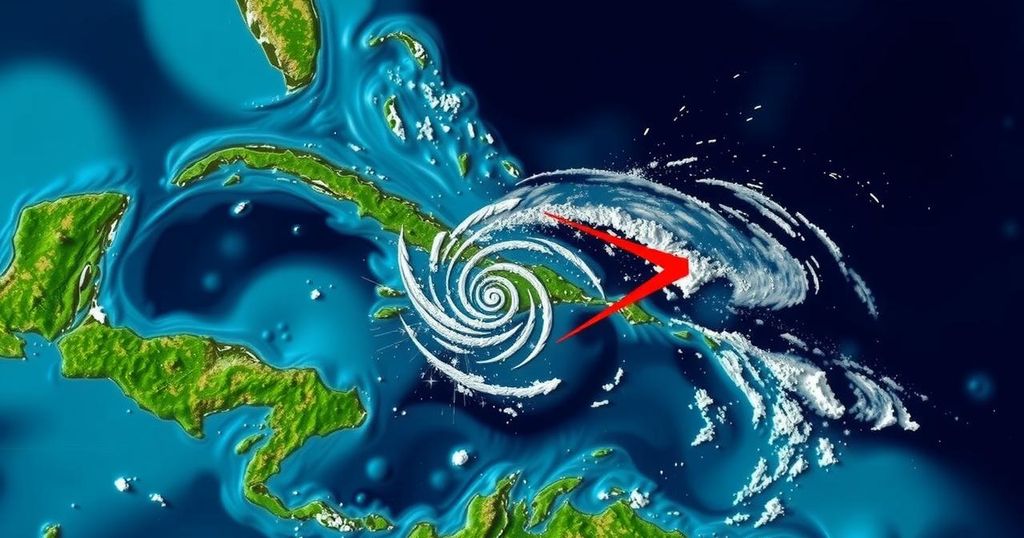Tropical Storm Oscar Approaches Bahamas After Impacting Cuba as a Hurricane
Tropical Storm Oscar, having made landfall in Cuba as a Category 1 hurricane, is advancing toward the Bahamas, resulting in six fatalities and extensive rainfall. The storm’s minimal wind field surprised forecasters, and significant flooding is anticipated, particularly in the southeastern Bahamas.
Tropical Storm Oscar has progressed toward the Bahamas following its landfall in Cuba as a Category 1 hurricane, resulting in the unfortunate loss of at least six lives due to intense rainfall across the region, which was already grappling with a separate, substantial power outage. As of Tuesday morning, Oscar was situated approximately 45 miles (75 kilometers) south-southeast of Long Island in the Bahamas, with sustained winds recorded at 40 mph (65 kph) and a north-northeast movement of 12 mph (19 kph), as stated by the National Hurricane Center in Miami. According to the Center, “Oscar is at best barely a tropical storm at this time”. The storm is projected to deposit as much as 5 inches (13 centimeters) of rain throughout the southeastern parts of the Bahamas, and potentially up to 8 inches (20 centimeters) in localized areas. A tropical storm warning is currently in effect for the central and southeastern Bahamas. Notably, Oscar has made history as the smallest documented hurricane, exhibiting a wind field of only around 6 miles (10 kilometers). This unusual occurrence took many by surprise, particularly as Oscar made its landfall on Grand Inagua Island in the Bahamas on Saturday, followed by a second landfall on the eastern coast of Cuba late Sunday. Michael Lowry, a hurricane specialist and storm surge expert, remarked in his analysis, “It is not often we see a colossal failure in hurricane forecasting,” highlighting that models had not predicted Oscar’s strengthening into a hurricane. In Cuba, Oscar dropped significant rainfall exceeding 15 inches (38 centimeters) in certain eastern areas, sparking concerns over severe flooding and potential landslides. The fatalities reported occurred in Guantánamo, where the storm hit against the backdrop of ongoing recovery efforts from a massive power blackout that had already incited minor protests and a stern government warning against any further unrest. Oscar is considered the 15th named storm and the 10th hurricane of the current Atlantic hurricane season, which spans from June 1 to November 30. The National Oceanic and Atmospheric Administration has anticipated an above-average hurricane season this year, attributing it to record warm ocean temperatures and projecting that the season may produce 17 to 25 named storms, including four to seven major hurricanes of Category 3 or higher. Moreover, Tropical Storm Kristy is currently a consideration in the Pacific, with reports indicating that it may strengthen into a hurricane by Tuesday evening.
The recent activities surrounding Tropical Storm Oscar highlight the ongoing vulnerabilities faced by the Caribbean islands during hurricane season. With an Atlantic hurricane season notorious for its unpredictability and intensity, storms like Oscar pose severe risks to the already strained infrastructures in regions such as Cuba and the Bahamas. The devastation caused by Oscar was intensified by existing issues in Cuba, where a massive blackout affected millions. Understanding these storms within the context of climate patterns and environmental phenomena is crucial for future preparedness and response efforts.
In conclusion, Tropical Storm Oscar’s trajectory highlights significant weather-related challenges for the Caribbean, particularly in Cuba and the Bahamas. Its unexpected transformation from a tropical storm to a Category 1 hurricane resulted in loss of life and further complications for a region already facing infrastructural struggles, particularly with power outages. The forecasts suggesting an above-average Atlantic hurricane season spotlight the urgency for preparedness in face of these natural threats.
Original Source: www.washingtontimes.com




Post Comment